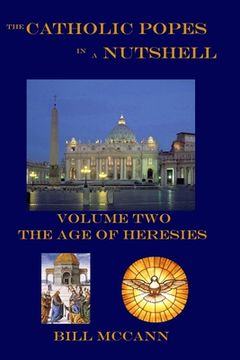Synopsis "The Catholic Popes in a Nutshell Volume 2: The Age of Heresies"
This is the Second volume in a planned series on the Catholic Popes. It takes us from St. Mark in AD 325 to the papacy of Gregory The Great which ended in AD 604. This is the Age of Heresies, a particularly difficult period in the early Church. Not only was there the, often fierce, internal arguments about doctrine which inevitably gave rise to a number of heresies, but there was political turmoil as the Western Roman Empire collapsed and Rome itself was sacked by the Germanic hordes.An Introductory Essay outlines the rise and fate of the succeeding Byzantine Empire, whilst the Concluding Essay summarises the thirty-one heresies that arose in the early centuries of the Church.Few reliable documents have survived from the period covered by this first volume. As result, we can only look through a gauze at the struggles endured and overcome in these first hostile centuries. Nevertheless, we can still see with sufficient clarity how the deeds and fates of these first 33 Popes laid the solid foundations for all that was to come.The Catholic Church is the largest and oldest Christian Church. It is the fount from which the eastern Orthodox Churches and all Christian sects have sprung. It is impossible to underestimate the influence of this Church on the birth and development Western, which is to say European, civilisation and culture. Despite its origins in 1st century Palestine, and despite its universality, the Catholic Church is a European Church at heart. Its centre has always been at Rome, the city it has done so much to build and beautify - and protect from outright destruction during the last dark days of the Second World War.The influence of this Church on the development of European history was immense. It was the influence of the Catholic Church that dragged Europe from the age of lawless and barbaric tribes into the regulated and, relatively, more humane age of the kingdoms of Europe. It was Irish Catholic monks who preserved for us the writings, the learning and the teachings of the ancient Greeks and Romans during the turbulent, frightening and almost catastrophic centuries of the so-called Dark Ages. Without these intellectual treasures, the glories of European culture and civilisation would have been impossible. Without these treasures, the Renaissance, that great outpouring of Thought, of Art, of Music, of Theatre, of Humanism and of Science would have been stillborn.And without the Catholic Church the glories of Thought, of Literature, of Art, of Architecture, and of Music in particular, would have been impossible. Through her direct participation, indirect inspiration and, most especially, liberal patronage she bequeathed us those things that we now treasure as signifiers of an educated and cultural man. Without her we would not today be able to enjoy the visual masterpieces of Michelangelo or Caravaggio or Leonardo da Vinci, for example, nor could we enjoy the Masses of Haydn and Mozart, Handel's Messiah or the Requiems of Faure, Brahms, Berlioz or Verdi, to give but a very few examples of the huge musical debt European Culture owes to the Catholic Church. Of course, the Catholic Church is a human institution and, like all human institutions, she has suffered, and suffers yet, from the whole kaleidoscope of human frailties, foibles and failings. To expect anything else would be unrealistic, to attempt to define the Church wholly in terms of those human weaknesses, as many in the sects that grew out of the Reformation still do, is utterly ridiculous.If those frailties, foibles and failings are to be found in the men who nurtured, developed and governed the Catholic Church, then so too are the faith, fidelity and fearlessness without which no human undertaking can survive. Of those men, the most conspicuous have been the 266 Popes who have led the Catholic Church from its beginning in AD 32 to the present day.

